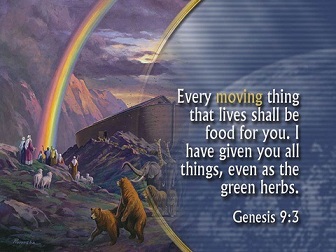
Biblical Distinctions Between Clean and Unclean Meat

Samuel Smith
23 Jan'19
5
LESSON 2
BIBLICAL DISTINCTIONS BETWEEN CLEAN AND UNCLEAN MEAT
You are welcome to another edition of Insights from God's Word, a Bible study programme that is committed to sharing God's Word by allowing the Bible to speak for itself.In this edition, we continue with our series on How to Prosper in Health. The topic for this study is: Biblical Distinctions Between Clean and Unclean Meat. In our previous study, we studied from Scripture that the original diet that God gave mankind was a plant-based diet comprising of fruits, grains, nuts and legumes (see
From
Beloved, before Noah and his family entered that ark of salvation, God specifically commanded Noah the following:
7:2 Of every clean beast thou shalt take to thee by sevens, the male and his female: and of beasts that are not clean by two, the male and his female.
7:3 Of fowls also of the air by sevens, the male and the female; to keep seed alive upon the face of all the earth."
(
1) The clean animals were to be used for worship sacrifices (see
2) The clean animals were to serve as food for the human family after the flood. It is important to note that the flood destroyed all the vegetation that served as food for the human race. It was under this circumstance that God permitted Noah and his family to eat flesh food (see
Beloved, it is clear from the texts we have reviewed so far that God's permission for the human race to eat flesh food did not include the use of unclean animals and birds. With only one pair each of the unclean animals and birds saved after the flood, many of these animals and birds would have been extinct if the command to eat flesh food meant all animals could be eaten. It is clear from the account in
After the flood, the large majority of mankind began worshipping the creature instead of the Creator until the knowledge of the true God almost became extinct. With the whole world almost given to idolatry, God called the patriarch Abraham (see
Friends, like the people who were saved through the flood, God gave ancient Israel His laws of diet, once again making the distinction between the clean and the unclean. It is important to note that the Gentiles who did not know the Creator God could eat anything, but not so with Israel, whom the Lord had chosen to be "a kingdom of priests, and an holy nation" (review
14:3 Thou shalt not eat any abominable thing.
14:4 These are the beasts which ye shall eat: the ox, the sheep, and the goat,
14:5 The hart, and the roebuck, and the fallow deer, and the wild goat, and the pygarg, and the wild ox, and the chamois.
14:6 AND EVERY BEAST THAT PARTETH THE HOOF, AND CLEAVETH THE CLEFT INTO TWO CLAWS, AND CHEWETH THE CUD AMONG THE BEASTS, THAT YE SHALL EAT.
14:7 Nevertheless these ye shall not eat of them that chew the cud, or of them that divide the cloven hoof; as the camel, and the hare, and the coney: for they chew the cud, but divide not the hoof; therefore they are unclean unto you.
14:8 And the swine, because it divideth the hoof, yet cheweth not the cud, it is unclean unto you: ye shall not eat of their flesh, nor touch their dead carcase.
14:9 THESE YE SHALL EAT OF ALL THAT ARE IN THE WATERS: ALL THAT HAVE FINS AND SCALES SHALL YE EAT:
14:10 And whatsoever hath not fins and scales ye may not eat; it is unclean unto you.
14:11 OF ALL CLEAN BIRDS YE SHALL EAT.
14:12 But these are they of which ye shall not eat: the eagle, and the ossifrage, and the ospray,
14:13 And the glede, and the kite, and the vulture after his kind,
14:14 And every raven after his kind,
14:15 And the owl, and the night hawk, and the cuckow, and the hawk after his kind,
14:16 The little owl, and the great owl, and the swan,
14:17 And the pelican, and the gier eagle, and the cormorant,
14:18 And the stork, and the heron after her kind, and the lapwing, and the bat.
14:19 And every creeping thing that flieth is unclean unto you: they shall not be eaten.
14:20 BUT OF ALL CLEAN FOWLS YE MAY EAT."
(
1) The animals must: a) have parted hoof; b) cleave the cleft into two claws; c) chew the cud.
2) The fishes must: a) have fins; b) must have scales.
3) The birds / fowls: There were no specific criteria in relation to clean birds or fowls in
a) They are not birds of prey;
b) They have crops that help to digest their food and prevent it from fermenting;
c) Their stomachs have a double skin which can easily be separated;
d) They have a hind toe which is clearly separated from the front toes.
(See articles in Jewish Encyclopedia, 1906 under Clean and Unclean Animals)
With the characteristics of the clean birds we have noted above coupled with our previous knowledge of the various unclean birds and their types that are mentioned in
Beloved, the Scripture makes it clear that as God was particular with righteous Noah in regard to the distinction between the clean and unclean animals species, so was He particular with ancient Israel; a nation whom He referred to as His own peculiar people. Now, at this point in our study, some questions I want us to reflect upon are these:
1) As the spiritual Israel of God (see
2) Will the Creator God change His views about species He knows are unclean and abominable to allow His chosen people who are living at the end of time to partake of such flesh?
Friends, the Scripture makes it clear that the God of the Bible is a God who does not change (see
What's more? From the book of Isaiah, we shudder to learn that those who willfully disobey the dietary laws of God will have to face the fury of God's executive judgement. From
66:16 For by fire and by his sword will the LORD plead with all flesh: and the slain of the LORD shall be many.
66:17 They that sanctify themselves, and purify themselves in the gardens behind one tree in the midst, EATING SWINE'S FLESH, AND THE ABOMINATION, AND THE MOUSE, shall be consumed together, saith the LORD."
(
Irrespective of these clear facts of Scripture, many in Christendom today continue to argue with various New Testament texts that Christians can partake of any flesh, whether clean or unclean. As we move forward in this series, we are going to consider all such New Testament passages one after the other. It is my prayer that the Lord will use this series to give light to His children who are yearning for the truth as is found in God's Word.
Exhortation: "For the LORD God is a sun and shield: the LORD will give grace and glory: no good thing will he withhold from them that walk uprightly. O LORD of hosts, blessed is the man that trusteth in thee" (
In our next study, we will consider the topic: "Every moving thing that liveth shall be meat for you": an exposition on
Stay blessed and keep shining for King Jesus.
Maranatha!
Powered by White Throne Ministries














